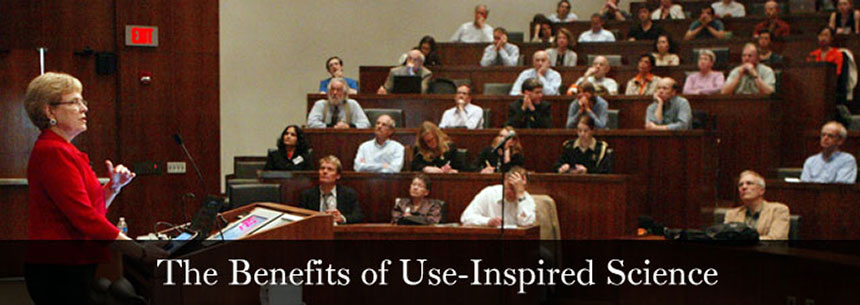The Benefits of Use-Inspired Science


At no time has it been more important to envision how science informs the approach to global problems, especially those in the environmental arena, from changes in climate and weather extremes to the health of oceans, food security, and more. In her May 9th delivery of the 2012 Taplin Environmental Lecture, Jane Lubchenco, Undersecretary of Commerce for Oceans and Atmosphere and Administrator of the National Oceanic and Atmospheric Association (NOAA), underscored the urgency for greater application of “use-inspired” science.


Yet the landscape for this science is changing dramatically at a time when, Lubchenco believes, it is needed more than ever before. Speaking to a crowd of over 150 faculty, staff, students, and community members in Dodds Auditorium, she said, “What we’re seeing, is that as the application of use-inspired science becomes more and more important, there is less and less of an appetite to fund this kind of science.”
Lubchenco made a distinction between government agencies that focus largely on fundamental science, such as the National Institutes of Health (NIH) and the National Science Foundation (NSF), as compared to mission-driven agencies like NOAA and the United States Geological Society (USGS) that seek principally to serve society’s goals rather than to advance science. The agencies that are doing well financially are those with a primary emphasis on basic research. The ones doing the least well are environmental science agencies such as NOAA and USGS. Lubchenco said she fears that, as the current federal budget crisis unfolds, the erosion of mission-oriented research is likely to accelerate. To address this problem, she argued for the need to rethink the current mental model about science.
Since World War II, the 1945 report, “Science the Endless Frontier,” authored by Vannevar Bush, has shaped how policy makers and the public think about investments in U.S. science and technology. “When Vannevar Bush framed his ideas, the assumption was applied science is so obviously relevant you don’t need to make the case for it. You need to make the case for basic science because that’s what’s hard to sell to government funders,” Lubchenco said. “As a young scientist, I grew up being told scientists must choose between doing basic science and applied science. It was sort of one or the other.”


“In other words,” said Lubchenco, “the U.S. needs to support scientific research that is cutting edge, that really pushes the boundaries of knowledge, but that is also directly relevant to societal problems.” She drew a distinction between this type of science and the science currently funded by the NSF which is “really blue sky, curiosity driven, cool stuff.” In her opinion, we need both, but the case has not really been made for the importance of use-inspired science.
Some agencies, she mentioned, have made a compelling case for doing both basic and use-inspired science, but these are specific to the areas of health and energy such as at NIH and the Department of Energy. The agencies whose science is not doing well are the environmental science agencies such as NOAA and the USGS. “I think it’s that area where it is appropriate to have a dialogue about the social value of that research….We haven’t made a comparable case for environmental sciences, and I think we need to because the pressures that are on our budgets are very, very intense. Much of the important work I’ve described, and that we have not yet been able to do, is not going to happen unless we can make a better case for it.”
In closing, Lubchenco summarized her argument for reframing scientific research to create some legitimacy for use-inspired science. “We tell members of Congress that it costs less than five cents a day for each American to fund all of what NOAA provides for the nation. I think it’s a pretty good deal. This is not a pitch for NOAA, although I know it sounds like it. It’s really an invitation to help us think about the role of science in our society, and how important use-inspired science is, in addition to basic science. We need that full depth. We need that full richness. We all benefit from it, and we need to make sure that it doesn’t fall by the wayside.”
Lubchenco’s May 9th lecture is available online.




